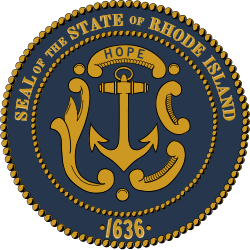| |||||||||||||||||
| |||||||||||||||||
 County results Fenner: 50–60% 60–70% 80–90% Wheaton: 60–70% | |||||||||||||||||
| |||||||||||||||||
| Elections in Rhode Island |
|---|
 |
The 1807 Rhode Island gubernatorial election was held on April 1, 1807, in order to elect the governor of Rhode Island. Democratic-Republican nominee and incumbent United States senator from Rhode Island James Fenner defeated Federalist nominee Seth Wheaton. [1]

